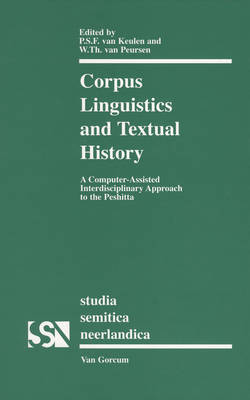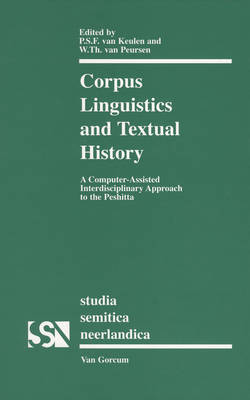
- Retrait en 2 heures
- Assortiment impressionnant
- Paiement sécurisé
- Toujours un magasin près de chez vous
- Retrait gratuit dans votre magasin Club
- 7.000.0000 titres dans notre catalogue
- Payer en toute sécurité
- Toujours un magasin près de chez vous
Corpus Linguistics and Textual History
A Computer-Assisted Interdisciplinary Approach to the Peshitta
Percy Van Keulen, Willem Th Van Peursen
305,45 €
+ 610 points
Description
Over the years the use of computers for research has become increasingly important in Biblical Studies. However, a combination of computational linguistics with diachronic text-critical and text-historical approaches has hardly ever taken place. Quite often, there is mutual misunderstanding between computational linguistics and more traditional approaches in the field of linguistics and textual analysis. For example, in computer-assisted research of modern text corpora it is common to treat the text as an unequivocal and unidimensional sequence of characters. In Biblical Studies, however, either text is considered an abstraction, the result of a scholarly reconstruction based on the extant textual witnesses. Here a fundamental difference in approach reveals itself.
The present volume tries to overcome the misunderstanding between the various disciplines and to establish how a fruitful interaction of information technology, linguistics and textual criticism, can contribute to the analysis of ancient texts. It addresses questions concerning the confrontation between synchronic and diachronic approaches, the role of linguistic analysis in the interpretation of texts, and the interaction of linguistic theory and the analysis of linguistic data.
The first section of this volume contains the papers presented at the CALAP seminar 2003. In the second section different aspects of the interdisciplinary analysis are applied to a selected passage from the Peshitta of Kings.
The present volume tries to overcome the misunderstanding between the various disciplines and to establish how a fruitful interaction of information technology, linguistics and textual criticism, can contribute to the analysis of ancient texts. It addresses questions concerning the confrontation between synchronic and diachronic approaches, the role of linguistic analysis in the interpretation of texts, and the interaction of linguistic theory and the analysis of linguistic data.
The first section of this volume contains the papers presented at the CALAP seminar 2003. In the second section different aspects of the interdisciplinary analysis are applied to a selected passage from the Peshitta of Kings.
Spécifications
Parties prenantes
- Auteur(s) :
- Editeur:
Contenu
- Nombre de pages :
- 380
- Langue:
- Anglais
- Collection :
- Tome:
- n° 48
Caractéristiques
- EAN:
- 9789023241942
- Date de parution :
- 01-01-06
- Format:
- Livre relié
- Format numérique:
- Genaaid
- Poids :
- 799 g

Seulement chez Librairie Club
+ 610 points sur votre carte client de Librairie Club
Les avis
Nous publions uniquement les avis qui respectent les conditions requises. Consultez nos conditions pour les avis.






